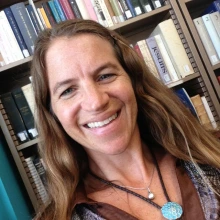New Article from Crocker (2016)

Rebecca Crocker (Ph.D. UArizona, 2016), who currently serves as post-doctoral scholar in the UA Center for Border Health Disparities, is pleased to announce a new publication titled “Santos Remedios: How Mexican Immigrants Use Authoritative Healing Knowledge to Survive Migration,” which she co-authored with Dr. Patrisia Gonzales from Mexican American Studies and American Indian Studies. The article, in Culture, Medicine, and Psychiatry, utilizes Brigitte Jordan’s theory of ‘‘authoritative knowledge’’ to show how and why Mexican immigrants’ ancestral and ecological-based healing knowledge travels with them through migration, arguing that it acts as an important survival mechanism that enables immigrants to actively intervene against novel threats to health and wellness inherent to the migration process. This article serves as the final publication stemming from Rebecca’s dissertation research, which was supervised by SoA’s Tom Sheridan (chair), Ivy Pike, and Susan Shaw (now at University of Massachusetts Amherst), and Patrisia Gonzales.
Abstract: Mexicans living in the United States frequently rely upon popular healing to address a broad spectrum of physical, psychological, and spiritual ailments. They practice Mesoamerican healing ways including using herbal remedies, employing nutritional health promotion and illness remediation, over the counter pharmaceuticals, prayer and religion, and visiting expert healers. In this article, we utilize Brigitte Jordan’s theory of ‘‘authoritative knowledge,’’ to show how Mexican immigrants’ ancestral and ecological-based healing knowledge travels with them through migration. Based on original ethnographic research in the Southwest borderlands, we expand an understanding of the factors that support the continuity of authoritative knowledge spatially and temporally. Mexicans’ healing knowledge persisted north of the border because it (1) incorporated a wide array of healing techniques and materials that remained accessible post-migration, (2) enabled immigrants to heal according to Mesoamerican worldviews that privileged natural modalities and a holistic approach to body, mind, and spirit, and (3) remained relevant by allowing immigrants to remedy daily health stressors inherent to Mexican migration, including the border crossing, detention and deportation, and daily fear provoked by undocumented status. While lay practices have often been interpreted as problematic by medical professionals, we conclude that Mexicans’ authoritative healing knowledge serves as a survival mechanism during the challenging circumstances of binational migration.
Anthro News Digest date: 07/16/2021

